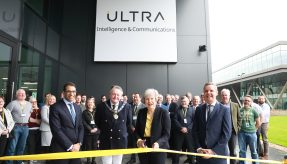
Writing for Defence Online, Ken Peterman, President, Government Systems at Viasat discusses the need for innovation to tackle future threats
Information Networks are the Key to Military Success
Secure, assured and ubiquitous communication is integral to every military operation across today’s battlespace. It’s critical that the right information is delivered accurately, securely and in a way that cannot be disrupted or exploited by enemy forces.
The UK Chief of Defence Staff, General Sir Nick Carter emphasised at RUSI on 11 December 2018 that potential enemies had invested in a range of new methods and capabilities designed to exploit what they see as our weaknesses. The range of threats now faced by UK means that we must recreate the innovation and ingenuity seen in wartime to succeed against cyber and electronic attack, space and counter-space weapons and low-yield nuclear weapons. Specialists, particularly those in the information sphere, will be in high demand.
Success Needs Smart Technology but More than That
UK military forces, along with the rest of UK Government, are facing budget cuts. The UK is facing defence budget shortfalls over the next decade of up to £20 billion but their malign impact has been reduced by modest uplifts in key areas. In a particularly positive move, the Modernising Defence Programmes initiative, still to be published in full, is expected to place a refreshing emphasis on three key positive approaches to change: an emphasis on speed of acquisition, a willingness to consider approaches which put modest capability into the hands of users and learn from doing this, and finally an emphasis on new and innovative contracting methods, without which the advantages of smart technology will not be exploited in full.
We are already seeing the benefits of this type of approach in the US (notably the Airborne and SOF communities) and in some parts of the UK Defence establishment. In these areas, thoughtful and innovative soldiers work closely with commercial engineers to embrace exciting new technologies and then then by their own operational knowledge and innovative skill, extend the use of these systems beyond the visions of their inventors.
Productive Impatience is growing in UK
All this has given great encouragement to the more impatient and innovative leaders in the Ministry of Defence (MOD) HQ, the three services and in Defence industry. The UK now has an opportunity to increase collaboration with private sector leaders to equip our forces with some of the most advanced communications and battle management capabilities ever developed, all this at a significantly lower cost to the end user and with no loss of integrity or security.
This approach makes best use of the commercial sector, which has benefited from accelerated technological advances in recent years. Perhaps the best examples of this dynamism are the development of the smartphone and of in-flight satellite broadband and near ubiquitous connectivity. Whilst growing progressively more sophisticated, the smartphone has continued to introduce easy to use cloud-based capabilities at a low cost. Some of these cloud-based applications, such as interactive maps, live HD video streaming and location sharing services, provide civilian users with more situational awareness than today’s UK warfighter receives from standard military commissioned equipment.
We have the ability to bring the same cloud-enabled civilian technologies to life for military forces rapidly, securely and effectively and to stay ahead of evolving threats. Key people in the UK Defence community now see this and are determined to change the acquisition model to achieve it. The forces of reaction have not given up, but are considerably weakened not only by the obvious capability and cost benefits of this approach, but by the clear example of the success of the commercial mobile IT model.
It is encouraging that the old perception that ‘bespoke is better’ is now increasingly seen as leading Defence systems down a blind and expensive alley. This fact is increasingly clear to the more perceptive UK Defence leaders, who spend a good deal of time studying the achievements of the more dynamic elements of the US military with COTS (Commercial Off the Shelf) and KOTS (Kinda Off the Shelf) technology. They are not slow to talk to the commercial firms that make this possible.
Another benefit is that the use of commercial systems sold and upgraded across the Western world helps to make Western coalition interoperability a default condition.
Emerging Technologies
The traditional procurement process of tweaking every bespoke piece of equipment can take up to 7-10 years. This procurement model never really worked well but no-one saw how to escape it. The path is now clear. The rapid pace of private sector innovation, reduces cost, improves resilience, improves collaboration with leaders in the commercial sector, enables greater security tailored to the needs of the operation and speeds up the upgrade cycle to near commercial rates.
For example, today’s commercial high-speed, secure global satellite communications (SATCOM) networks, like Viasat’s Hybrid Adaptive Network concept, present the UK military and its allies with a opportunity to access new and emerging cloud-based capabilities that will improve tactical communications and redefine the nature of modern warfare. As shown by Viasat at this year’s Association of the United States Army conference, these cloud-based connectivity solutions are available today; and with near-peer adversaries also pursuing similar emerging technologies, it will be critical for the MoD and its allies to move quickly to deliver cloud-based solutions in order to maintain tactical edge needed to deter these future threats.
Pulling Technology, Operations and Contracts together
These advantages are now, ours to embrace and it is heartening to see that at a high level the UK Government as a whole and the UK MOD in particular are both encouraging those dynamic individuals, previously seen as maverick, to be heard. This gives them the top-cover to encourage the use of systems that embrace the latest battle-winning technology, ensure that it is tailored to specific operational needs and use innovative contracting methods that enable them to upgrade it easily and frequently.
With progress at this rate, it will not be long before a brigade in contact with the enemy will have as much network connectivity as a teenager’s bedroom.
To learn more about cyber security and how your business can stay protected from threats, visit the Cyber Essentials Online website.
If you would like to join our community and read more articles like this then please click here.







